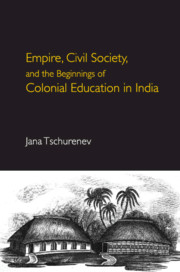Book contents
- Frontmatter
- Dedication
- Contents
- List of Figures
- List of Tables
- List of Abbreviations
- Acknowledgements
- Introduction: Empire Civil Society, and Educational Transformation in India
- 1 A Colonial Experiment in Education, Madras, 1789–1796
- 2 Education of the Poor, 1805–1813
- 3 Missionaries, Empire, and the Cause of Universal Education, 1792–1824
- 4 Race, Class, and Gender: The Social Agenda of Education, 1809–1830
- 5 Rules and Numbers: Transforming Rural Education, 1814–1830
- 6 Intellectual Conquest: Education Societies, ‘Useful Knowledge’, and the Bengal Renaissance, 1817–1854
- 7 Civil Society, Government, and Educational Institution-Building, Bombay Presidency, 1819–1882
- 8 Teaching the Marginalized: Universal Education and the Politics of Inequality, 1789–1937
- Conclusion: The Emergence of Public Elementary Schooling in an Imperial Frame
- Bibliography
- Index
3 - Missionaries, Empire, and the Cause of Universal Education, 1792–1824
Published online by Cambridge University Press: 26 April 2019
- Frontmatter
- Dedication
- Contents
- List of Figures
- List of Tables
- List of Abbreviations
- Acknowledgements
- Introduction: Empire Civil Society, and Educational Transformation in India
- 1 A Colonial Experiment in Education, Madras, 1789–1796
- 2 Education of the Poor, 1805–1813
- 3 Missionaries, Empire, and the Cause of Universal Education, 1792–1824
- 4 Race, Class, and Gender: The Social Agenda of Education, 1809–1830
- 5 Rules and Numbers: Transforming Rural Education, 1814–1830
- 6 Intellectual Conquest: Education Societies, ‘Useful Knowledge’, and the Bengal Renaissance, 1817–1854
- 7 Civil Society, Government, and Educational Institution-Building, Bombay Presidency, 1819–1882
- 8 Teaching the Marginalized: Universal Education and the Politics of Inequality, 1789–1937
- Conclusion: The Emergence of Public Elementary Schooling in an Imperial Frame
- Bibliography
- Index
Summary
It is generally acknowledged that the attainment of the art of reading is a great advance in the progress of civilisation; and it is equally certain that no well-founded hopes of success on the efforts for the propagation of Christianity can be entertained, unless the rising generation in Heathen countries are enabled to acquire the faculty of searching the Scriptures for themselves. To effect these great objects the means are now provided; and it is only requisite for benevolent men of all sects and parties to concentrate their energies, and […] to employ the best methods for covering the earth with knowledge as the waters cover the sea.
In the first decades of the nineteenth century, the British Empire became a space for the circulation of pedagogical knowledge, and the development of educational governance. The imperial social formation connected the localities of Madras and London, in which new pedagogical knowledge and strategies of educational reform were produced. It also provided the context in which the British and Foreign School Society (BFSS) and its partner organizations laboured to re-export the new ‘British system’ of education to India, and to other British-controlled parts of the world.
Anna Johnston suggested distinguishing between the ‘imperial’ and the ‘colonial’ as different levels of interaction. This terminology, she argues, ‘attempts to highlight the slippages between imperial policy and the colonial practice of that policy’. I found this distinction convincing, and helpful for structuring my own narrative. Before turning back to the sites of the colonial encounter, this chapter focuses specifically on imperial entanglements. Most importantly, it explores the convergence between the British debate on the education of the poor, and the Protestant missionary revival, which took place almost simultaneously. The same two groups which supported the BFSS, utilitarians and evangelicals, were also a driving force of the ideology of the imperial civilizing mission. This convergence produced an imperial education movement, which created the conditions for intensive pedagogical exchange. A network of voluntary associations – missionary and secular, operating from the metropole and locally in the colony – cooperated in ‘the cause of universal education’.
- Type
- Chapter
- Information
- Publisher: Cambridge University PressPrint publication year: 2019



